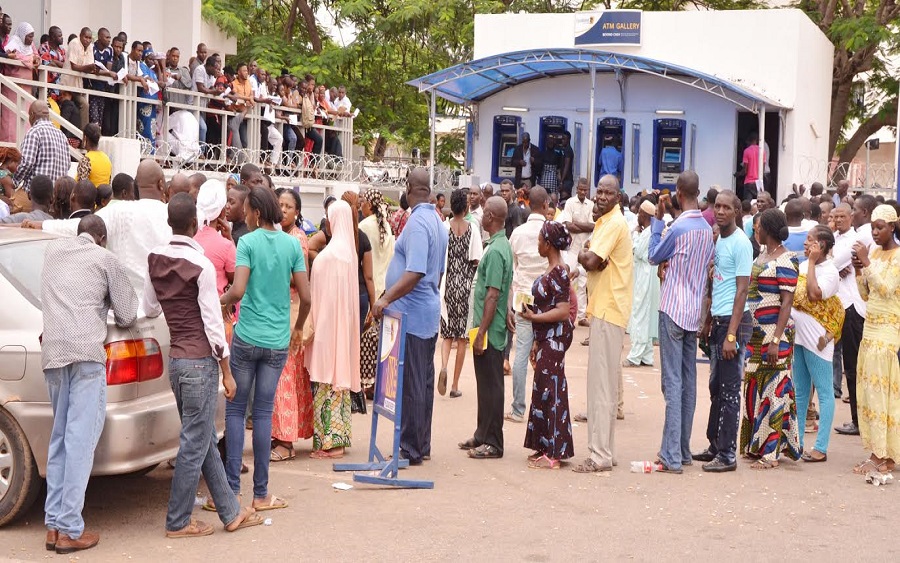Following last week’s lifting of the COVID-19 lockdown in Abuja, Lagos, and Ogun states, one of the first things most Nigerians did was to rush down to the banks. As Nairametrics had reported, it was quite dramatic, as long queues formed in front of different banks in Lagos and Abuja.
In line with safety guidelines, the bank customers were prevented from entering the banking halls all at once. Instead, the banks ensured that only a limited number of people were allowed inside at the same time. As a result, the crowd outside the banks kept increasing. This was the case throughout much of last week.
The reason those bank customers risked being infected by the Coronavirus as they violated social distancing whilst standing in those queues, is as sad as it is disturbing. During the month-long lockdown, many of them experienced various types of failed online banking transactions. This is why they stormed the banks in large numbers as soon as they could move freely again.
Remote working made it impossible to assist customers
According to Mr. Mbanefo, a relationship manager in a bank (name withheld), working from home during the lockdown made it impossible to adequately assist customers who were having challenges. This is because many bank workers did not have access to some of the vital tools they would normally need to attend to such customers. He explained:
“One of the challenges of working from home as a banker is that there are lots of software that we use that cannot be accessible from home because of security reasons; not because they cannot be made available to us at home. For example, you cannot check people’s account balance from your house. So, even though the software to do that can be made available for us at home, it can’t.
“Also, having access to files that are saved in your work computer is key when you are working. But when you work from home as a banker, you cannot access such files. You also cannot use USB and other devices to copy them to your laptop. So, that’s another challenge.
“Note that all these are rules that can be relaxed if the society needs them to be. It’s just that banks are very paranoid about security because we are handling money.”

But the main problem is all about technological inadequacy
Speaking to Nairametrics, a US-based Nigerian HR professional, Ikechukwu Ossi, explained that last week’s bank rush was indicative of the adverse effects of banks’ lack of technological preparedness. According to him, the Nigerian banking industry is comprised mainly of “face-to-face financial services providers who treat online/technology services as novel products designed for the elite or educated class of the society.”
He also faulted the fact that Nigerian banks typically work 9-5, even as the skills required of most bankers are “basic” and focused mainly on banking.
READ MORE: Nigerian banks face gloomy future over low oil prices, coronavirus
Nigeria’s banking industry needs drastic adjustments in a post-COVID-19 era
- The need for increased usage of technology to add value to banking and the banking process. Therefore, Nigerian banks “will need to go aggressively digital overnight. Unfortunately, banks that are not prepared (or lack the platform to make this aggressive transition) will lose business to not only other big banks but to smaller niche banks who may be a tard more nimble!”
- Big bank brands will need to re-earn their customer loyalty via their ability to adapt quickly. This is especially important, considering the fact that good customer service provision is expected to fall to an all-time low as businesses struggle to adapt to the changes wrought by COVID-19.
- In terms of the future of work/how work is conducted for the bank employees, Ikechukwu Ossi noted that there will be a change in the required skill and competency requirements for talent within the industry.
“To illustrate my points, here are a few questions that Bank CEOs and CBN governor need to answer for themselves and maybe to shareholders – Why would a financial services institution in 2020 require a customer to visit a bank branch to complete an account opening or a loan application form? Why do we need this many employees (with all the inefficiencies) to handle a single banking transaction? Why have we not automated a majority of the banking transaction to improve efficiencies? Why do we need so many highly skilled banking employees and why do they need to work so many hours per week? In post COVID19, why do we need a 50-storey headquarter building?”
READ ALSO: What banks might do to avoid getting crushed by Oil & Gas Loans
Without a doubt, nobody could have envisaged with much certainty that the Coronavirus pandemic would have this much impact on the Nigerian economy and specifically, the banking industry. But one thing is clear now, and that is the fact that the future. And like Ossi noted in his concluding remarks, we do not need a crystal ball to tell us some of the inevitabilities, including those listed below:
- Banks will be forced to operate highly efficient, highly automated/online and realtime banking operations
- Efficiency requirements, Capialism and shareholder returns will cause a downward review of costs (employee costs being the top expense figure)
- Lay-off though inevitable will probably not affect the highly skilled and multi-faceted banking talent. Also, the skill requirements to hire a talent will be different.
- Also, the ways of working withing banking may likely improve; organizations have been forced to innovate and see the pros and cons of remote work. The expectations is for banks to improve on the efficiencies of remote working and reap the benefits therein.
- I suspect that super-sized banks will continue to exist beside micro-sized/micro-finance banks – these smaller banks have shown they are nimble and because their size is easily adaptable to a changing business environment – this will appeal to a niche customer base who will remain loyal for this reason.
























This made interesting reading, I live in England and rather naively assumed banks around the world were all pretty much the same in regards to how they operate. It is hard to remember when I last visited a bank to open an account or apply for a loan, everything here can be done either by phone banking or Internet banking and it’s very successful.
I have heard some employees have not been paid for weeks, how do those people exist?
I have seen somewhere there is a ban on money moving into or out of Nigeria, how does that work? Surely you need international trading.
I do not work in the financial sector, perhaps that is why I don’t see the logic in the lack of money movement!